Employers are legally obligated to withhold payroll and income taxes from their employees' paychecks. As an employee, you should review withholding taxes so that you understand what is being taken out of your paycheck, but you should also make sure that you are withholding the optimal amount. To get a sense of the essentials, check out this overview of tax withholding on paychecks.
Social Security Contributions
As of tax year 2020, your employer should withhold 6.2% of your earnings up to $137,700 per year. You don't have to make Social Security contributions on wages over that threshold. Note that your employer makes a matching payment, and if you are self employed, you pay both of these amounts.
Medicare Premiums
Medicare premiums are 1.45%, and there is no cut-off threshold. In fact, as of tax year 2020, you must pay an additional 0.9% on wages over $200,000.
For example, if you earn $300,000 in wages, you pay 1.45% of the first $200,000 and 2.35% on the remaining $100,000 in Social Security contributions. Again, your employer must match these payments, but they only have to match the base amount. They do not have to match the additional 0.9%.
Income Tax
While the above withholding amounts do not change, income tax can vary significantly, and you need to make sure you're withholding the desired amount for your situation. If your employer doesn't withhold enough income tax, you may face a bill when you file your tax return.
On the flip side, if your employer withholds too much income tax, you may qualify for a tax refund. Many people enjoy receiving refunds, but from a financial perspective, they are a losing prospect. If you receive a tax refund, you are essentially loaning those funds to the government for free. If you don't need that money throughout the year, you can invest it so that you are earning interest.
To ensure your employer withholds the most effective amount of income tax, request to fill out a new W-4 (Employee's Withholding Certificate) at the beginning of every tax year. This form requests information on all your income sources and deductions including children and other qualifying dependents.
If you have a relatively straightforward situation, you can simply note your dependents and income you receive from other jobs on this form. However, in a lot of cases, you need to use the supporting worksheets to complete this document.
In particular, there are worksheets that help you calculate the impact of itemizing deductions and earning self-employment income. For instance, if your spouse runs their own business, you may want to increase your withholding to cover their self-employment tax so you don't face a tax bill at the end of the year. In that same vein, if you itemize and claim significantly more than the standard deduction, you should factor in those deductions when completing this form so that you don't overpay income tax throughout the year.
To learn more about how to optimize your withholding or reduce your tax liability, contact a financial professional today. They can help you identify the best steps forward for your financial journey.
Important Disclosures:
The opinions voiced in this material are for general information only and are not intended to provide specific advice or recommendations for any individual. To determine which investment(s) may be appropriate for you, consult your financial advisor prior to investing. All performance referenced is historical and is no guarantee of future results. All indices are unmanaged and cannot be invested into directly. No investment strategy or risk management technique can guarantee return or eliminate risk in all market environments.
The information provided is not intended to be a substitute for specific individualized tax planning or legal advice. We suggest that you consult with a qualified tax or legal advisor.
LPL Financial Representatives offer access to Trust Services through The Private Trust Company N.A., an affiliate of LPL Financial.
LPL Tracking # 1-939827
Source
All figures in the above post:
